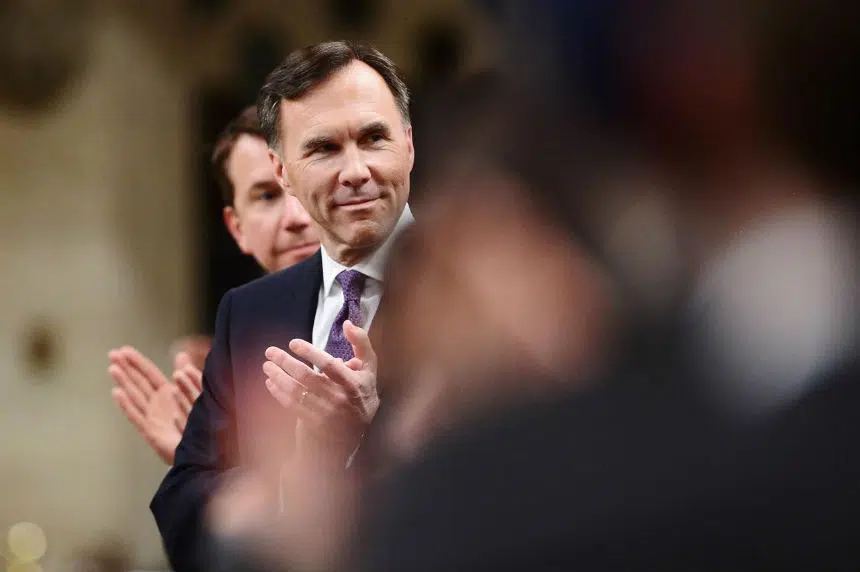By Craig Wong, The Canadian Press
OTTAWA — The Liberal government moved to tighten the tax rules for small businesses in the federal budget Tuesday as it fine tuned the changes that prompted an uproar last year.
However, Finance Minister Bill Morneau still faces the challenge of corporate tax cuts in the U.S. that have prompted worries that companies will choose to invest there instead of Canada.
In the budget, Morneau opted to hold the line on corporate taxes in Canada, choosing to help businesses in other ways, including with spending to help women-led businesses grow, innovation and diversification of trade.
“We know businesses are concerned about the outcome of North American Free Trade Agreement talks and tax changes in the United States,” he said.
“We will be vigilant in making sure Canada remains the best place to invest, create jobs and do business — and we will do this in a responsible and careful way, letting evidence, and not emotion, guide our decisions.”
The minister faced a backlash over his initial plans to change small business taxes last year before backing down on some of the proposed changes and reviving a promise to reduce the small business tax rate.
The government had pitched the changes as a way to prevent wealthy Canadians from gaining an unfair advantage and paying less tax, but small businesses said the changes hurt the middle class.
In the budget this year, Ottawa moved to gradually eliminate the amount eligible for the preferential small business rate as the amount of passive income rises above $50,000 with the small business deduction limit reduced to zero at $150,000. It also moved to limit the advantages that some businesses can obtain when they pay certain dividends.
The changes, which will apply starting with tax years that begin in 2019, are expected to bring in $925 million a year by the 2022-23 fiscal year.
“We are changing the rules for three per cent of private corporations, because the wealthiest Canadians should not be able to use private corporations to pay less tax than the middle class,” Morneau said.
Bruce Ball, vice-president of tax for CPA Canada, said he was happy that the passive income change was a simpler solution compared with other options.
“At the same time though we still believe that they should look at taxation of passive income along with a number of other changes as part of a more general tax review,” he said.
To help crack down on tax cheats, the government will spend $90.6 million over five years to address additional cases that have been identified both domestically and internationally.
Ottawa is also moving to improve the tax rules to prevent what it said was typically Canadian banks and other financial institutions from gaining a tax advantage by creating artificial losses through sophisticated financial instruments. The move is expected to generate roughly $2.5 billion for the government over five years.
It said it would also clarify the application of certain rules for limited partnerships to prevent unintended tax advantages.
While the minister left the corporate tax rate unchanged, the government spending plan did include cash on several fronts to help Canadian businesses and further its key priorities including supporting women in the workforce.
The government said it will make $1.4 billion available over three years in new financing for women entrepreneurs through the Business Development Bank as well as $250 million over three years through Export Development Canada for financing and insurance for women-owned and women-led businesses.
The budget also included $105 million over five years to regional development agencies to support investment in businesses led by women and $10 million over five years to connect women with expanded export services.
To help Global Affairs Canada boost diplomatic and trade support in Asia, the budget includes up to $75 million over five years starting in 2018-19 with $11.8 million per year. The money will include boosting the number of diplomats and trade commissioners in China as well as moves to promote trade with China and other Asian markets.
The government will also provide $191 million over five years to Global Affairs Canada and Natural Resources Canada to support softwood lumber jobs through litigation under the World Trade Organization and the NAFTA dispute settlement mechanisms.







